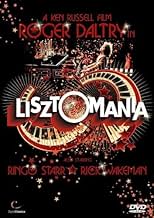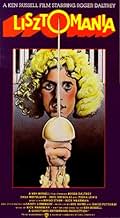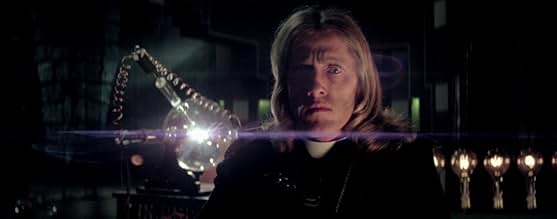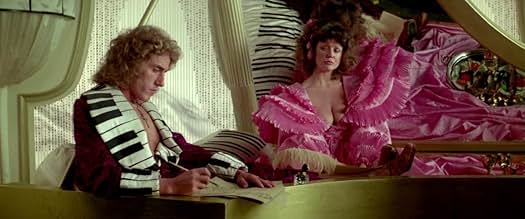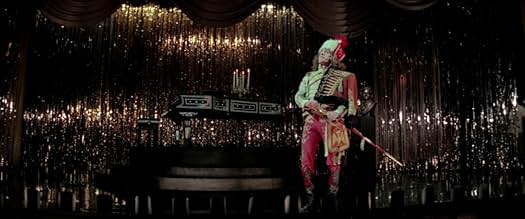CALIFICACIÓN DE IMDb
6.1/10
3.3 k
TU CALIFICACIÓN
El compositor y pianista Franz Liszt intenta superar su hedonista estilo de vida mientras se ve arrastrado repetidamente por las numerosas mujeres de su vida y por el también compositor Rich... Leer todoEl compositor y pianista Franz Liszt intenta superar su hedonista estilo de vida mientras se ve arrastrado repetidamente por las numerosas mujeres de su vida y por el también compositor Richard Wagner.El compositor y pianista Franz Liszt intenta superar su hedonista estilo de vida mientras se ve arrastrado repetidamente por las numerosas mujeres de su vida y por el también compositor Richard Wagner.
- Dirección
- Guionista
- Elenco
- Dirección
- Guionista
- Todo el elenco y el equipo
- Producción, taquilla y más en IMDbPro
Opiniones destacadas
I'm a great fan of Ken Russell's films. What I like most about them is the director's ability (and willingness) to totally immerse his productions into whatever mania happens to be the driving force behind its subject. The results are often excellent, occasionally poor. But never have I seen a film that was, at once, so incredibly visionary and God-awful as Lisztomania.
In most Russell films, fantasy takes on an important role in the dramatic narrative. In Lisztomania, the narrative is virtually jettisoned in favor of fantasy, and not to altogether admirable effect.
Still, any motion picture that can give us Richard Wagner portrayed as a Transylvanian vampire who gains musical inspiration by sucking the blood of Franz Liszt deserves points for imaginative hubris.
Ultimately, Lisztomania is less a film than a comic boot pastiche. Its humor is, by turns, dazzling and lead-footed. Compared to THE MUSIC LOVERS (another Russell bio-pic, this time about Tchaikovsky), Lisztomania is, for all it gleeful, lip-smacking gusto, a rather tired affair, largely because it's metaphors are so pedantic and literal-minded.
I should point out, however, that Wagner's third-act transformation (or should I say resurrection) into a machine gun-toting, Frankenstein-Hitler rock star (yes, you read correctly) is a genuinely
In most Russell films, fantasy takes on an important role in the dramatic narrative. In Lisztomania, the narrative is virtually jettisoned in favor of fantasy, and not to altogether admirable effect.
Still, any motion picture that can give us Richard Wagner portrayed as a Transylvanian vampire who gains musical inspiration by sucking the blood of Franz Liszt deserves points for imaginative hubris.
Ultimately, Lisztomania is less a film than a comic boot pastiche. Its humor is, by turns, dazzling and lead-footed. Compared to THE MUSIC LOVERS (another Russell bio-pic, this time about Tchaikovsky), Lisztomania is, for all it gleeful, lip-smacking gusto, a rather tired affair, largely because it's metaphors are so pedantic and literal-minded.
I should point out, however, that Wagner's third-act transformation (or should I say resurrection) into a machine gun-toting, Frankenstein-Hitler rock star (yes, you read correctly) is a genuinely
To many, this film is the stunning-proof that director Ken Russell never had it, and that idiocy and egotism were mistaken for genius. You could say mistaking idiocy and egotism for genius has been the appeal of rock music! Others might say that Russell is simply childish or immature, and that his films are the "masturbatory-fantasies" of an overgrown-adolescent. This belief is unfounded. Is this film over-indulgent? Yes it is, dear readers, very-much-so, because it is art, not entertainment. That-said, if you chuck any expectations, this is a funny film and allegory about the rise of pop-culture in the 19th Century. It draws parallels between Liszt's fame with the other generally-hollow spectacle known as "rock." This is great film-making, and it should be noted that it has similarities between itself and "Rocky Horror," and even "Hedwig and the Angry Inch," as they all examine and explore the relationships between sexuality and pop-culture in similar-areas. It really is true that women threw their underwear at Franz Liszt during his performances, and that he had many-many lovers--groupies.
Lisztomania is an odd bridge-between "classic" rock and the emergent punk-movement of the time. The film can also be seen as a statement that "rock" is not really subversive or rebellious at-all, but ultimately arch-conservative, and repressive. Amen. It's just a hilarious, wild-romp that will make your guests extremely nervous, which films should do. Movies should challenge people to think and reflect--at-least occasionally. Ironically (or maybe-not!), Mr. Russell had contracted Malcolm MacLaren and Vivienne Westwood to design the S&M-costumes for his film, "Mahler." It should also-be-noted that "Liszt-o-Mania" was released exactly the same year that MacLaren's shop "SEX" opened on King's Row, the rest is as they say, is history. It couldn't be more camp, it has Little Nell in it.
Basically-put, this is about the the ins-and-outs of "why" we want and need pop-culture, and WHAT we generally-want from our "pop-idols" (sex, of-course). One could easily-say this film criticizes the absurd spectacle that rock had become by 1975, and we get this quite-often in the film. But this theme goes much-deeper, into the relationship-between artist and patron (once, just the aristocracy, now the mob is added). The sexuality is about mass-psychology, too, so Wilhelm Reich gets-his-due, and there is a plethora of Freudian-imagery. It is certainly a very-personal film for Russell, and probably amuses him as much as it does myself that it enrages so-many critics, but it should be noted that some of the absurdity and excess came from the producer of the film, not Mr. Russell. Ken Rusell enrages all the right-people, and that's what some film-making should be.
God love this lapsed-Catholic, and God love his ways. A flawed part of his canon, but very watchable and educational. As Russell began his career doing documentaries and impressionistic-films on composers for the BBC, it makes-sense that this is considered one of his most heretical-works. He complains about the opening country-song in his autobiography 'Altered States', and there were other aspects of the production he didn't want in the film. It's interesting to note that the 1980s was the period of his purest-work, due mainly to a three-picture-deal with Vestron. The 1970s were actually a very mixed-bag for him, as Lisztomania attests. He isn't entirely-pleased with it, but had some fun with the material, and there it is. I think it's a hoot, which means it isn't on DVD.
Lisztomania is an odd bridge-between "classic" rock and the emergent punk-movement of the time. The film can also be seen as a statement that "rock" is not really subversive or rebellious at-all, but ultimately arch-conservative, and repressive. Amen. It's just a hilarious, wild-romp that will make your guests extremely nervous, which films should do. Movies should challenge people to think and reflect--at-least occasionally. Ironically (or maybe-not!), Mr. Russell had contracted Malcolm MacLaren and Vivienne Westwood to design the S&M-costumes for his film, "Mahler." It should also-be-noted that "Liszt-o-Mania" was released exactly the same year that MacLaren's shop "SEX" opened on King's Row, the rest is as they say, is history. It couldn't be more camp, it has Little Nell in it.
Basically-put, this is about the the ins-and-outs of "why" we want and need pop-culture, and WHAT we generally-want from our "pop-idols" (sex, of-course). One could easily-say this film criticizes the absurd spectacle that rock had become by 1975, and we get this quite-often in the film. But this theme goes much-deeper, into the relationship-between artist and patron (once, just the aristocracy, now the mob is added). The sexuality is about mass-psychology, too, so Wilhelm Reich gets-his-due, and there is a plethora of Freudian-imagery. It is certainly a very-personal film for Russell, and probably amuses him as much as it does myself that it enrages so-many critics, but it should be noted that some of the absurdity and excess came from the producer of the film, not Mr. Russell. Ken Rusell enrages all the right-people, and that's what some film-making should be.
God love this lapsed-Catholic, and God love his ways. A flawed part of his canon, but very watchable and educational. As Russell began his career doing documentaries and impressionistic-films on composers for the BBC, it makes-sense that this is considered one of his most heretical-works. He complains about the opening country-song in his autobiography 'Altered States', and there were other aspects of the production he didn't want in the film. It's interesting to note that the 1980s was the period of his purest-work, due mainly to a three-picture-deal with Vestron. The 1970s were actually a very mixed-bag for him, as Lisztomania attests. He isn't entirely-pleased with it, but had some fun with the material, and there it is. I think it's a hoot, which means it isn't on DVD.
The real-life Franz Liszt had an incredibly bizarre life, with plenty of erotic encounters. He also wrote gorgeous music. This should have been a great movie.
Unfortunately, Ken Russell goes even more nuts than usual with his Ken Russellisms. Gratuitous breasts? Check. Sparkly crosses? Check. Sexy nuns? Check. Phallic symbols? Check. Adolescent girl behaving shockingly? Check. The only thing missing is the water that usually gushes symbolically through his pictures.
Roger Daltrey comes off as a complete idiot in interviews, yet gives incredible performances in everything from Pete Townshend to William Shakespeare. He tries to save Lisztomania with his acting (he can go from farce to high drama easily)and his good looks (though he's gorgeous with his signature curls straightened, why exactly DOES his hair get straighter as the film progresses?)
Many of the supporting actors help a bit, too, including a tiny but memorable, pre-Rocky Horror scene from Little Nell.
I've seen Tommy many times, but I don't think I'll ever watch Lisztomania more than once. However, I'm not sorry I saw it. I would love to own the soundtrack--Liszt and Wagner sound terrific redone as 70's guitar-rock.
At a mere 103 minutes, there is too much padding. I recommend that people watch as I did, with a hand on the fast-forward of your remote.
Lisztomania is too mired in its own coolness and allegory. Many scenes start out promisingly, and many of the visuals are shocking or impressive at first, but then the scenes go onnnn and onnnn...
Unfortunately, Ken Russell goes even more nuts than usual with his Ken Russellisms. Gratuitous breasts? Check. Sparkly crosses? Check. Sexy nuns? Check. Phallic symbols? Check. Adolescent girl behaving shockingly? Check. The only thing missing is the water that usually gushes symbolically through his pictures.
Roger Daltrey comes off as a complete idiot in interviews, yet gives incredible performances in everything from Pete Townshend to William Shakespeare. He tries to save Lisztomania with his acting (he can go from farce to high drama easily)and his good looks (though he's gorgeous with his signature curls straightened, why exactly DOES his hair get straighter as the film progresses?)
Many of the supporting actors help a bit, too, including a tiny but memorable, pre-Rocky Horror scene from Little Nell.
I've seen Tommy many times, but I don't think I'll ever watch Lisztomania more than once. However, I'm not sorry I saw it. I would love to own the soundtrack--Liszt and Wagner sound terrific redone as 70's guitar-rock.
At a mere 103 minutes, there is too much padding. I recommend that people watch as I did, with a hand on the fast-forward of your remote.
Lisztomania is too mired in its own coolness and allegory. Many scenes start out promisingly, and many of the visuals are shocking or impressive at first, but then the scenes go onnnn and onnnn...
Ken Russell did have some interesting ideas that came across as entertaining but there were times where his style got ahead of him and the film in question, and Lisztomania epitomises a bit of both. Lisztomania is definitely a polarising film, people will find it wonderfully weird while others will find it tasteless. With me, both seem to be here which is the main reason why the film is not an easy one to rate. If you are looking for a biographical drama, look elsewhere, the first half does have a story to it(more than likely to be fictionalised though) but the second half is like you've having a long really surreal dream and the characters are merely parodies. There are some striking visuals that are colourful and surreal while the music is pulsating and catchy and there is evidence of wit and imaginative touches like the homage to Charlie Chaplin and Hammer films, the fantasy interlude, Liszt's arrival at the castle and the Frankenstein figure(though that may also come under vulgar too because it's Wagner and the Nazis). Fiona Lewis and Veronica Quilligan are good as well. Some of it can feel music-video-like though- much of the second half has very little plot and feels like an excuse to string different vignettes together with a lot of tone shifts- and while the special effects are mostly okay the spaceship is rather fake. Lisztomania does change tone a lot and some of the shifts come without warning and feel very chaotic and there are some touches that are vulgar like the piano torture machine, the giant penis, sex scenes at high speed, Nazi iconography. Not entirely which category the vaginal fantastic voyage comes under, visually it was imaginative but there was a real weirdness as well, the same could be said of the most unique version of the Pope you will ever see. Most of the acting is really not very good, Paul Nicholas is pretty awful, Ringo Starr has a naturalness but doesn't have much to do and Roger Daltry is rather dull. Russell has shown with his Elgar and Delius biographies that he can be restrained and Mahler also(though also with some outrageous images), but Lisztomania is the prime example that I've seen of his filmography where restraint and subtlety go completely out the window, and at times it can feel heavy-handed. Overall, very difficult to rate but is unlike many other films seen before, personally not entirely sure whether I liked or disliked it, most likely to be neither. 5/10 Bethany Cox
Franz Liszt (Roger Daltrey) is a hedonistic composer in old Europe. In real life, the Hungarian musician lived from 1811 to 1886. Richard Wagner is a music associate. Ringo Starr plays The Pope.
This is surrealistic biopic. It can be seen as a mess, self-indulgent, and undecipherable. It can also be seen as intriguing and challenging. I choose to see it as the later. It's definitively not safe. I prefer a mess more than an uninteresting bland biopic. As an actor, Daltrey is not that great but his rock star personality is undeniable. Ken Russell is throwing a lot into this. It's a lot and it runs a bit long. I wish it wraps up a little sooner. Wagner needs to have more scenes as the antagonist. I would also like a bigger better actor playing him. He doesn't have to be a real musician. All in all, this is at least interesting.
This is surrealistic biopic. It can be seen as a mess, self-indulgent, and undecipherable. It can also be seen as intriguing and challenging. I choose to see it as the later. It's definitively not safe. I prefer a mess more than an uninteresting bland biopic. As an actor, Daltrey is not that great but his rock star personality is undeniable. Ken Russell is throwing a lot into this. It's a lot and it runs a bit long. I wish it wraps up a little sooner. Wagner needs to have more scenes as the antagonist. I would also like a bigger better actor playing him. He doesn't have to be a real musician. All in all, this is at least interesting.
¿Sabías que…?
- TriviaFirst movie to be encoded with a Dolby Stereo optical soundtrack.
- ErroresDuring the flashback when Liszt is notating the music for Dream of Love; on the second page in the first measure there is the note E-Flat written as an E with the flat symbol next to it. However, since the song is already in the key of A-Flat which includes E-Flat in the scale, it is not necessary to notate the Flat symbol next to the E note. This is only done if the previous E-note was notated as an E-Natural and even then the flat symbol would be placed in parenthesis.
- ConexionesFeatured in Hollywood Singing & Dancing: A Musical History - 1970's (2009)
- Bandas sonorasRienzi/ Chopsticks Fantasia
Composed by Richard Wagner and Franz Liszt
Selecciones populares
Inicia sesión para calificar y agrega a la lista de videos para obtener recomendaciones personalizadas
- How long is Lisztomania?Con tecnología de Alexa
Detalles
- Fecha de lanzamiento
- País de origen
- Idioma
- También se conoce como
- Lisztomanía
- Locaciones de filmación
- Productoras
- Ver más créditos de la compañía en IMDbPro
- Tiempo de ejecución1 hora 43 minutos
- Mezcla de sonido
- Relación de aspecto
- 2.35 : 1
Contribuir a esta página
Sugiere una edición o agrega el contenido que falta

Principales brechas de datos
By what name was Lisztomania (1975) officially released in India in English?
Responda

